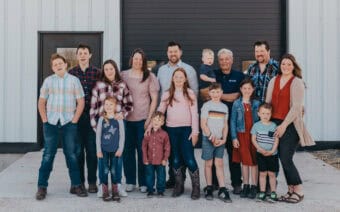October 18, 2022
NORTHEAST WISCONSIN — Despite a surge in hemp-derived products following its legalization in Wisconsin in 2018, growers of the plant, as well as sellers of the products produced from it, said they still find themselves facing a wide array of obstacles – ranging from cultural stigma to legal hurdles.
Peter Gray – the director of Door County Cannabis Company, a hemp-based cannabis company located in Baileys Harbor – said the hemp industry is complicated because there’s a lack of general education.
Gary said part of the stigma stems from the history of the cannabis industry.
“Even as we progress forward with federal legalization of cannabis…,” he said, “it’s been labeled a schedule I drug for so long that we haven’t done much research in mainstream media.”
Gary said the differences between THC (Tetrahydrocannabinol), the substance responsible for its psychoactive effects, and hemp, which is a versatile crop that can be grown for seed, fiber or oil, can be muddled in the public eye.
Hemp seeds can be crushed to produce oil, which can then be used in a variety of things, such as soaps and shampoos.
Hemp fiber can be used in paper, textiles, fabrics and various construction materials.
After the oil is extracted, it can also be used to make capsules, edibles and more.
Paul Renard, the president of Fox Business Development, has worked alongside Mark Rozmarynoski, owner of Konopie – a family-operated hemp farming operation located in Denmark, Wisconsin – since the state first legalized hemp.
Renard said at first, “it was like a gold rush.”
 Paul Renard, right, said he has worked alongside Mark Rozmarynoski, owner of Konopie – a family-operated hemp farming operation located in Denmark since Wisconsin first legalized hemp. Submitted Photo
Paul Renard, right, said he has worked alongside Mark Rozmarynoski, owner of Konopie – a family-operated hemp farming operation located in Denmark since Wisconsin first legalized hemp. Submitted Photo
“Now we’re kind of on the other side of that coin,” he said.
When hemp was first legalized in Wisconsin, Renard said hundreds of people jumped at the opportunity to grow what seemed to be an easy cash crop, but quickly found themselves stonewalled by banks and financial institutions.
“When I first started raising money for medical cannabis companies in 2016, there were no banks — there still are no banks – that want to work with us,” he said. “Even as a hemp company (Konopie), we would still have our accounts shut down, even though it’s legal. So, a lot of fundraising in the industry has moved on to individual investors.”
Gary said even to this day, “none of these kinks are fully worked out.”
“As far as being able to advertise or marketing, I mean, we understand we shouldn’t be making medical claims, but we would try to promote a Harvard study about CBD and Facebook and Instagram wouldn’t like that, and we would get our advertising accounts banned, just for promoting our farm growing legal hemp in Wisconsin,” he said. “And the biggest downside of a lot of those hurdles was we couldn’t even get our message out there. We couldn’t even educate the way we wanted to.”
Renard said Konopie’s greenhouse, farm fields and CBD oil are all certified organic, with all planting, harvesting and crafting being done onsite at the Brown County farm – which he said ensures the highest level of oversight and traceability throughout the entire process.
Renard and Gary said both of their products are also third-party tested.
Limited research
Renard said part of the stigma out there stems from the lack of official research being done, which is limited because universities need an Institutional Review Board designated by the FDA in order to conduct biomedical research involving human subjects.
Gray – who has a background in sports medicine, which he said prioritizes evidence-based medicine – said there hasn’t been many research studies that show CBD can have a negative impact, even in higher doses.
“It’s been studied for sleep,” he said. “It’s been studied for anxiety. It’s been studied for pain. Most of the research is pointing to it having an anti-inflammatory effect and showing decent results with low-grade arthritic pain.”
Gary said the majority of hemp consumers are seeking sleep aid, though there is also an older population that uses them for pain management.
“We don’t have any clinical research on it, but the feedback we do receive is that melatonin, for example, might help you fall asleep, but THC-derived products provide (our customers) with a longer night’s rest. Pain is a tough one to manage, because everybody’s pain is different, and it’s also subjective, but CBD, in our minds, is adjunct to other pain management.”
A fine line
Hemp farmers also tread a fine legal line, as none of their products are backed or verified by the FDA, so they’re also limited in what benefits they can promote to consumers.
“We want to speak what we know to be true, and we want to find out the correct answers before we tell customers you need to take our products a certain way or take CBD a certain way to find the best results,” Gary said. “A lot of times it’s worth a try. We always tell everybody to be with their physician before trying, to make sure they aren’t worried about any drug interactions and to go from there. And that’s been our approach, and it’s been a good approach. I feel like we have been able to build trust with our consumers.”
Legal limit
Part of the farming process also includes making sure the plants’ THC levels are below Wisconsin’s legal limit of 0.3%.
Gray said they relied heavily on their seed suppliers in the early years to ensure their plants would have a low enough THC content.
 Door County Cannabis Company specializes in small-batch hemp-derived products. Submitted Photo
Door County Cannabis Company specializes in small-batch hemp-derived products. Submitted Photo
?“We’ve gotten in a better position now of not having to stress too much about our products going hot,” he said.
Renard said the growing process is labor intensive because the hemp plant is hermaphroditic, meaning it can change from female to male, and the male plants are useless for harvesting CBD.
The male plants need to be pulled to prevent them from fertilizing the females, which Renard said makes hemp farming “more old-school farming than it is farming in today’s age.”
“If the genetics of the plant are correct, there is much less concern for the plant’s THC percentage spiking, but anything that stresses the plants, like weather being too hot or too cold, can cause the THC percentage to spike,” he said. “A particularly cold night can ruin an entire crop, which then must be burned and filmed so the footage can be submitted to the state.”
Gary said President Joe Biden recently announced a pardon for all federal charges of simple possession of cannabis, which both he and Renard see as a step in the right direction for their industry.
“I think it’s a good first step – at least cannabis should be looked at in a different light than fentanyl or other opioids,” Gary said.
He said he’d like to see the industry get to a position where people can research without running into roadblocks.
“So that we can know more about it, and we can have some clinical research behind a lot of the products on the market,” Gary said.
Renard said he sees the move to be primarily political, but hopes it starts the ball rolling in the right direction.
Gray said he actively reaches out to its customers to obtain feedback.
“Obviously, we like to hear that our customers feel better after using our CBD oil or other products,” he said. “The general feedback we get a lot is based on sleep and obviously, we know the benefits of good sleep. You do generally feel better in active daily living. So, we actively reach out to our customers to receive feedback on how they’re feeling.”
 Three centuries of goodness: Seroogy’s turns 125
Three centuries of goodness: Seroogy’s turns 125 Hard work, determination lead self-taught baker to success, storefront
Hard work, determination lead self-taught baker to success, storefront




